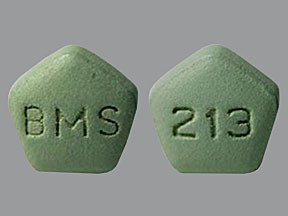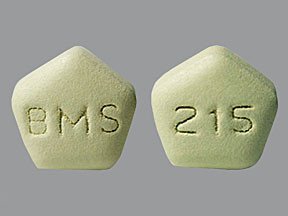DACLATASVIR - ORAL
PHONETIC PRONUNCIATION: (dak-LAT-as-vir)
COMMON BRAND NAME(S): Daklinza
GENERIC NAME(S): daclatasvir dihydrochloride
Uses
USES: Daclatasvir is used with another antiviral medication (sofosbuvir) to treat chronic (long-lasting) hepatitis C, a viral infection of the liver. Daclatasvir should never be used without sofosbuvir. Daclatasvir and sofosbuvir may also be used with another antiviral medication (ribavirin). These medications together reduce the amount of hepatitis C virus in your body, which helps your immune system fight the infection and may help your liver recover. Chronic hepatitis C infection can cause serious liver problems such as scarring (cirrhosis), or liver cancer. It is not known if this treatment can prevent you from passing the virus to others. Do not share needles, and practice "safer sex" (including the use of latex condoms) to lower the risk of passing the virus to others.
How to use DACLATASVIR - ORAL
HOW TO USE: Read the Patient Information Leaflet if available from your pharmacist before you start taking daclatasvir and each time you get a refill. If you have any questions, ask your doctor or pharmacist. Also read the drug information for your other antiviral medication(s). Take this medication by mouth with or without food as directed by your doctor, usually once daily. The dosage is based on your medical condition, response to treatment, and other medications you may be taking. Be sure to tell your doctor and pharmacist about all the products you use (including prescription drugs, nonprescription drugs, and herbal products). This medication works best when the amount of drug in your body is kept at a constant level. Take this drug at evenly spaced intervals. To help you remember, take it at the same time each day. Continue to take daclatasvir and your other antiviral medication(s) for the full length of time prescribed, even if your symptoms disappear after a short time. Stopping any of the drugs too early may result in a return of the infection.
Side Effects
Precautions
Interactions
Overdose
Images
Reviews
Faq for DACLATASVIR - ORAL
Daclatasvir is an antiviral medication that is used in combination with other drugs to treat chronic hepatitis C. It belongs to a class of drugs called direct-acting antivirals (DAAs) and is taken orally.
Daclatasvir works by inhibiting the replication of the hepatitis C virus (HCV) in the body. It targets a specific protein called NS5A, which is essential for the virus to reproduce. By blocking this protein, Daclatasvir helps to reduce the amount of HCV in the body and may lead to a cure in some patients.
Common side effects of Daclatasvir include headache, fatigue, nausea, diarrhea, and abnormal liver function tests. These side effects are usually mild and resolve on their own. However, if they persist or become severe, it is important to inform your healthcare provider.
The duration of Daclatasvir treatment depends on various factors, such as the genotype of the hepatitis C virus and the presence of liver cirrhosis. Typically, treatment lasts for 12 to 24 weeks. Your healthcare provider will determine the appropriate duration for your specific condition.
Yes, Daclatasvir, when used in combination with other antiviral medications, has the potential to cure hepatitis C. The success rate of treatment with Daclatasvir varies depending on factors such as the genotype of the virus and the presence of liver cirrhosis. It is important to follow your prescribed treatment regimen and consult with your healthcare provider for the best chances of achieving a cure.
Daclatasvir is generally safe and effective in patients with liver cirrhosis. However, the dosage and duration of treatment may need to be adjusted based on individual patient factors and liver function tests. It is important to discuss your medical history and condition with your healthcare provider before starting Daclatasvir.
Daclatasvir may interact with certain medications, including some HIV medications, antifungal drugs, and certain cardiovascular medications. It is crucial to inform your healthcare provider about all the medications you are taking, including prescription, over-the-counter, and herbal supplements, to check for potential drug interactions.
Daclatasvir is usually taken once daily with or without food. It is important to take the medication exactly as prescribed by your healthcare provider and complete the full course of treatment. Do not skip doses or stop taking Daclatasvir without consulting your healthcare provider.
Daclatasvir may harm an unborn baby and is not recommended during pregnancy. It is also not known if Daclatasvir passes into breast milk. Therefore, it is advisable to discuss with your healthcare provider if you are pregnant, planning to become pregnant, or breastfeeding before starting Daclatasvir.
Warning
WARNING: Although this medication helps many people with hepatitis C, it may cause people who also have another liver problem called hepatitis B to get worse. Before starting this medication, tell your doctor if you have ever had hepatitis B. Tell your doctor right away if you have new or worsening symptoms of liver disease, such as nausea/vomiting that doesn't stop, loss of appetite, stomach/abdominal pain, dark urine or yellowing eyes/skin.
Disclaimer
IMPORTANT: HOW TO USE THIS INFORMATION: This is a summary and does NOT have all possible information about this product. This information does not assure that this product is safe, effective, or appropriate for you. This information is not individual medical advice and does not substitute for the advice of your health care professional. Always ask your health care professional for complete information about this product and your specific health needs.



No Reviews Yet